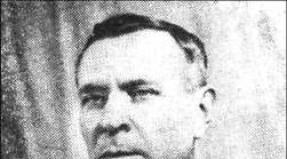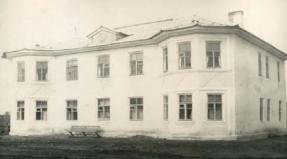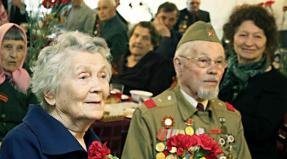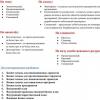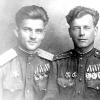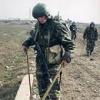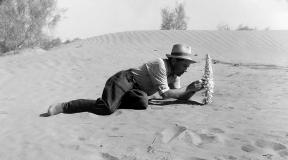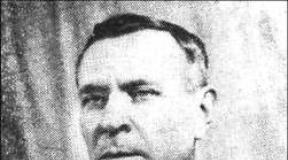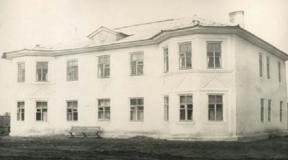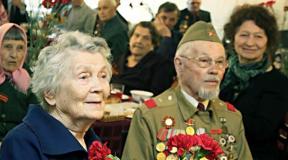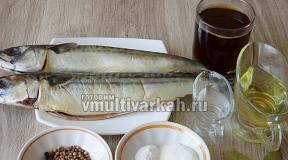A Voronezh resident freed from slavery in Makhachkala returned to his homeland. Nikulin, Pyotr Fedorovich - TSU Electronic Encyclopedia Maria Ilkova with her brother Pyotr Nikulin
Prisoner of the Caucasus. A Voronezh resident, whom volunteers found in Dagestan, was brought home. Pyotr Nikulin, as it turned out, spent 15 years in labor slavery - he was deceived into working at a local enterprise, his documents were taken away, and he was kicked out. He spent a quarter of his life without a home, working for food. The long road home is in the Vesti-Voronezh story.
Pyotr Nikulin doesn’t recognize the eastern outskirts of Voronezh - he hasn’t been here for 20 years. He arrived on a passing bus from Makhachkala, everything he had acquired over the years fit in a couple of bags - and these things were given to Pyotr by an acquaintance. Volunteer Alexey Nikitin accompanied him to Voronezh to help in case a person without documents was thrown off the bus at a traffic police checkpoint.
Alexey Nikitin, activist of the volunteer movement “Alternative”:
“This person is definitely no longer in any database. It is precisely this kind of person who has been staying for so long, this is the second case, who is no longer in the passport databases, who need to be urgently taken out of the republic without documents, without anything.”
It is not clear how Peter will restore his passport; 15 years ago he came to Dagestan from Ukraine. I lived with my family in Sukhodolsk, and in 1999 an acquaintance offered to earn some money. Since then, none of Peter’s relatives have seen him.
Pyotr Nikulin:
“I went and offered one there: “You work for three months, earn money and come. I went, they stopped me there and that’s it. I walked, I worked, well, I won’t go stealing. I’ll work for one, I’ll work for another, someone will give me 50 rubles and a pack of cigarettes.”
Sister Maria has only this photo left in the family archive - here Peter Nikulin is about 30. She found out that his brother had disappeared six months later, and the news that Peter was still alive came several months ago - the local police officer called my sister, found a man on the street of Makhachkala.
 Maria Ilkova, sister of Peter Nikulin:
Maria Ilkova, sister of Peter Nikulin:
“And then we’ll look. It is possible to treat him, or it is impossible if he continues to live like this, but only so that he already lives here in his native land. Because the local police officer from there called and said: “Well, what are you waiting for, they’ll tear off his head and throw it on the road.”
Volunteers found Pyotr Nikulin in the hospital, where he was admitted with severe pneumonia and frostbitten legs. Several fingers had to be amputated. Volunteers say there are many people like Nikolai. People without documents live in sheds - farms, they graze sheep and literally work for food. They simply have no money to return home - and they cannot buy a ticket without a passport.
Zakir Ismailov, curator of the “Alternative” volunteer movement in Dagestan:
“His first job was at a brick factory in the village of Krasnoarmeysky, where they took away his military ID and passport, paid him 500 rubles and kicked him out of the factory, and after that he was left without documents, wandering around different farms and different owners for 15 years.”

However, members of the “Alternative” movement say that people end up in labor slavery not only in Dagestan; farms where actual slaves worked were found in the Stavropol Territory, Krasnodar Territory, and Moscow region. Three years ago, police found such a farm in the village of Parusnoye. Its 33-year-old director, along with several of his subordinates, forced at least four people to work for free. They were kept in a closed barracks; those who did not obey were chained and beaten with sticks. One of the slaves who tried to escape was even thrown into the fire by the guards and then left at the hospital door. The farmer was sentenced to 4 years.
But the terrible story for Pyotr Nikulin, his relatives hope, is over. Treatment awaits him and good news - his grandson is growing up in Ukraine.
Natalya Zubkova, Ivan Tokarev, Alexey Baranov
Peter Nikulin (Raghu)- One of the first professional
didgeridoo performer, has been playing this instrument since 1996,
manufactures wooden didgeridoos.
Since 2002 he has been constantly playing in the group “SAFETY MAGIC”. Also collaborates with
other groups such as: Pan-Asian Ensemble (formerly
Experimental project of the WA-ON ensemble of the Moscow Conservatory),
“Bay of Whale”, “Exit Project”, “HydroFonics”, Oleg’s “Exotic Band”
Kireev and participated in recordings. Participated in
festivals "SKIF", "Inhalation", "Sayan Ring", "Miller-Fender",
“Usadba-Jazz”, “Ethnolife”, “Empty Hills”, “Invasion”, etc. In 2006
opened a didgeridoo school in Moscow.
He visited India many times, spent 3 years at the Osho Ashram in Pune, where
engaged in meditation practices, took in-depth long-term
trainings, including on breathing, healing and Gurdjieff movements.
For several years he has been studying breathing and sound under the guidance of
Tuvan shaman, singer and musician Nikolai Oorzhak.
Didgeridoo school course.
In a programme:
- Learning basic skills and techniques for playing the didgeridoo.
- Various types of circular breathing.
- Breathing with “support”.
- Lip basing exercises.
- Exercises for voice development.
- The concept of rhythm, drive, groove.
- Breathing techniques and meditation.
- Various styles of playing the didgeridoo.
- Communication with like-minded people, live exchange of experiences, participation in jams,
concerts, festivals.
The didgeridoo is an ancient indigenous trance musical instrument.
Australia. Since the 80s, the instrument has become popular and received widespread
distribution in the world.
The low vibrating sound of the didgeridoo is associated with mysticism,
meditation, voices of spirits and shamanism.
When playing the didgeridoo, a unique circular technique is used.
(circular) breathing. To learn how to play the didgeridoo, you need to
relax, free yourself from unnecessary tension and allow
spontaneous creativity to express itself through breath, sound and rhythm.
The didgeridoo has its own acoustic characteristics, however
the possibilities and beauty of sound are hidden in the skill of the performer. This
a fascinating challenge of self-development and self-knowledge - literally
“breathe” life into the didgeridoo.
Petr Nikulin: “At the Didgeridoo School I share my experience of playing this
a mysterious musical instrument. I studied a lot on my own,
by trial and error, it took
quite a long time, but now I know how to master these techniques
faster. Along with purely technical things such as breathing with
support, ambishur, basing, strengthening of vocal cords, used
meditation techniques, since meditation facilitates learning and
promotes the development of creative abilities. Presented at school
a method that has been developed over 11 years, it includes
knowledge and experience acquired in meditation groups, concerts,
jams and when communicating with many musicians - performers on
didgeridoos, brass players and vocalists."
The cost of the masterclass is 350 rubles. Duration - 1.5 hours. The number of students is 10-15 people.
Volunteers of the all-Russian anti-slavery project “Alternative” returned home Pyotr Nikulin, freed from slavery in Makhachkala. The sister met the man at the entrance to Voronezh at about 19:00 on Thursday, February 18.
Pyotr Nikulin complained about the cold - the man had only summer rubber shoes. On the bus his legs became very numb. The rescued Voronezh resident is waiting for a bandage - in Makhachkala he suffered frostbite on his legs. Doctors recommended amputation of several fingers. Pyotr Nikulin had to go through police checkpoints with an old military ID and a USSR-era passport.
Maria Ilkova with her brother Pyotr Nikulin
Photo - Elena MinnibaevaVolunteer Alexey Nikitin wrote in the “Alternative” group on the social network how Pyotr Nikulin passed the posts.
– In the second hour there is a long check at the Artesian checkpoint (the border of Dagestan with Kalmykia). In addition to passport control, all passengers go through a metal detector and a personal search; a police officer spends several minutes trying to match a photo of a young Soviet soldier, Pyotr Nikulin, with the very aged original standing in front of him. In the end, without saying anything, the military man returns it to the owner, as they say, my heart is relieved,” said Alexey Nikitin.

Volunteers of the all-Russian anti-slavery project “Alternative” by a native of the Voronezh region, 58-year-old Pyotr Nikulin. A man was admitted to the clinic with frostbite on his legs. For the last six months he had been living on the street, and before that he had been a slave for 15 years. The man either worked at a brick factory or worked on a farm: tending sheep, cleaning barns, and doing various auxiliary work. According to “Alternative” volunteer Zakir Ismailov, who found the Voronezh man in the hospital, Peter was released due to his unsuitability for work - he became weak and was unnecessary to his “employers.” On Wednesday, February 17th,
N Ikulin Pyotr Ivanovich - gun commander of the 507th Army Anti-Tank Artillery Regiment (5th Shock Army, 1st Belorussian Front), sergeant.
Born on January 11, 1921 in the village of Mokrye Niva, now Velizh district, Smolensk region, in a peasant family. Russian. In 1935 he graduated from primary school. He worked on a collective farm for several years. Since 1939 he lived in Leningrad (now St. Petersburg) and worked as a plasterer.
In 1940 he was drafted into the Red Army. He graduated from the regimental school for junior commanders. At the front during the Great Patriotic War from June 1941. He fought as part of the troops of the Western, Central, Southern, Stalingrad, Southwestern, 3rd Ukrainian, 1st Belorussian Fronts. He fought near Kharkov, participated in the Battle of the Volga, liberated Ukraine, and defeated the Nazis in Poland and Germany. Member of the CPSU(b)/CPSU since 1942. He particularly distinguished himself in battles during the Vistula-Oder offensive operation.
Pyotr Nikulin's gun crew was deservedly considered one of the best in the division. During a rapid raid behind enemy lines, artillerymen, with well-aimed fire, paved the way for riflemen and tanks to strategic points, railway and highway junctions, airfields, and bridges. They swept away barriers, destroyed enemy reserves as they approached, and sowed panic.
On January 30, 1945, in the battle for the village of Friedeberg (Strzelce-Krasnskie, Gorzow Voivodeship, Poland), gun commander Sergeant Nikulin moved the gun to direct fire and opened sudden fire on enemy firing points. He was among the first to break into this village. Pursuing the enemy, he was the first to cross the Oder with a battery and, before the infantry arrived, repulsed 9 counterattacks of the Nazis. One of the crew remained, being wounded, and continued to fight. In these battles, he knocked out 2 enemy tanks and a self-propelled gun.
U Order of the Presidium of the Supreme Soviet of the USSR on March 24, 1945 for the exemplary execution of command assignments and the courage and heroism shown in battles with the Nazi invaders to Sgt. Nikulin Pyotr Ivanovich awarded the title of Hero of the Soviet Union with the Order of Lenin and the Gold Star medal (No. 7346).
In 1945, P.I. Nikulin was demobilized due to disability. Returned to peaceful work. After the war he worked as a flight mechanic in Siberia. In recent years he lived and worked in the mines on a collective farm in the Olsky district of the Magadan region. Died July 31, 1975. He was buried in the city of Magadan at the Marchekan cemetery. In 2005, the grave was found and an obelisk was installed on it.
Awarded the Order of Lenin (03/24/45), the Order of the Patriotic War, 2nd degree (02/12/45), and medals.
At home, in the city of Velizh, a bas-relief monument was erected in the Alley of Heroes.
